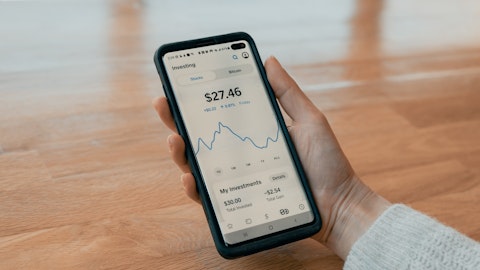In this article, we’ll explore the 12 Stocks Investors Should Monitor Closely According to Jim Cramer.
In a recent episode of Mad Money, Jim Cramer discussed the current state of the economy, noting that there are essentially two separate economies at play. One economy is struggling with higher interest rates, making it harder for businesses and individuals to thrive, while the other seems unaffected by these rates. This division explains why, even after a double rate cut, the stock market, including the Dow, S&P, and Nasdaq, still experienced declines.
“There really are two economies in this country. There’s one that needs lower interest rates because business is slowing and it’s harder to find a job, and then there’s another that says we don’t really care about where the rates are. That’s how we can get a double rate cut today and still see the Dow dipping 103 points, the S&P declining 29 points, and the Nasdaq shedding 31 points.”
Jim Cramer: Tech Companies Flourish Despite Economic Concerns
Jim Cramer highlights that many companies, especially retailers and restaurants serving low-income customers, are worried about high interest rates and needed the recent double rate cut to improve their forecasts. While this cut benefits the housing and industrial sectors, which initially rose in stock prices before selling off, the tech sector in Silicon Valley remains largely unaffected. Cramer describes tech leaders as having escaped the constraints of interest rates, focusing on innovation and catering to businesses rather than consumers. Their success relies more on their ability to innovate than on interest rate fluctuations.
“There are so many companies I talk to that truly worry about the economy and say they can’t make their forecasts because rates are too high. We’ve been hearing that from most retailers and restaurants, especially those that cater to the less well-off. They needed this double rate cut—believe me. It’s great for housing, and it can help the industrials; those stocks ran in anticipation and sold off when we got what we wanted. That is a very typical action.
But how about the tech economy, the one based out here where we are right now? When you’re talking to companies in Silicon Valley, it almost feels like the people who run these companies are like inmates who escaped from the asylum of interest rates years ago. What they do is exploit opportunities that allow them to become integral to the enterprise. They don’t really care about the consumer; they’re selling to businesses that then sell to you. So their total addressable market doesn’t hinge on interest rates; it hinges on how innovative they are. That’s a story you’ve heard from all the companies we’ve interviewed. These are companies about innovation.”
Additionally, he explains that tech companies are not selling everyday goods like homes, washing machines, or cars. Unlike housing, which relies on lower mortgage rates to boost sales, the tech sector focuses on creating software that simplifies the home-buying process. While lower rates can encourage new businesses, many startups are too small to need extensive software solutions.
“You see, these tech companies aren’t selling homes; they aren’t selling washing machines or cars or steel or plastic—things worth less than a dollar that are sold for more than a dollar at a dollar store. Housing, of course, needs lower mortgage rates to get sales going. Tech doesn’t care about mortgage rates; they just want to create software that reduces some of the friction you encounter in the process of buying a home. Lower rates make it more likely that people start new companies, but most new companies are too small to need major enterprise software. Companies we talk to can see small-cap companies go up, but big enterprise software? Not so much.”
Cramer notes that the Federal Reserve cut rates to help control inflation, which benefits more businesses overall. However, in the tech industry, the focus is on increasing efficiency through automation, often resulting in fewer employees. These tech companies aim to avoid being affected by the Fed’s decisions because relying on them would indicate weakness and vulnerability to the economic cycle, which they actively seek to evade.
“The Fed wanted to be sure that inflation is contained and going in the right direction, which then allowed them to relent and cut by 50 basis points. Now, more businesses in the East can thrive, but out here, the presumption is that all enterprises are trying to raise margins, often by automating everything that can be automated, which means using fewer people. These tech companies are automators; they never want to be hostage to the Fed. They don’t want you to be hostage to the Fed because that would be a sign of weakness—a sign of cyclicality. Oh, they hate cyclicality. Why be hostage to the business cycle if you don’t have to?”
Rising Stars: Artificial Intelligence (AI) Boosts Profits Even as Sales Slow
Finally, Jim Cramer emphasizes that many people see artificial intelligence as a key player in today’s market. Companies that leverage AI can improve their profit margins, which boosts earnings even if their overall sales are declining. This means that even without increasing sales, AI can help businesses become more profitable.

Our Methodology
This article summarizes Jim Cramer’s latest Morning Thoughts, in which he analyzed several stocks. We selected 12 companies and ranked them by their ownership levels among hedge funds, beginning with those that are least owned and moving to those that are most owned.
At Insider Monkey we are obsessed with the stocks that hedge funds pile into. The reason is simple: our research has shown that we can outperform the market by imitating the top stock picks of the best hedge funds. Our quarterly newsletter’s strategy selects 14 small-cap and large-cap stocks every quarter and has returned 275% since May 2014, beating its benchmark by 150 percentage points (see more details here).
Jim Cramer Reveals 12 Stocks Investors Should Monitor Closely
12. InterContinental Hotels Group PLC (NYSE:IHG)
Number of Hedge Fund Investors: 16
Jim Cramer highlighted that Goldman Sachs analysts have upgraded InterContinental Hotels Group PLC (NYSE:IHG)’s rating from neutral to a “buy.” This change suggests a more positive outlook on InterContinental Hotels Group PLC (NYSE:IHG)’s potential for growth, indicating that analysts believe it’s a good time to invest in the company.
“Goldman analysts also upgraded InterContinental to a ‘buy’ from neutral.”
InterContinental Hotels Group PLC (NYSE:IHG) has a strong outlook, highlighted by robust Q2 2024 earnings of $1.5 billion, a 12% increase from last year, and a net income of $350 million. This growth is driven by a resurgence in travel demand and high occupancy rates across InterContinental Hotels Group PLC (NYSE:IHG) diverse brand portfolio.
As leisure and business travel recover, InterContinental Hotels Group PLC (NYSE:IHG) is well-positioned due to its global presence and variety of brands that cater to different market segments. InterContinental Hotels Group PLC (NYSE:IHG) is strategically expanding its luxury and premium offerings, like InterContinental and Kimpton, to tap into the growing consumer preference for high-end travel experiences, which boosts revenue per available room.
The InterContinental Hotels Group PLC (NYSE:IHG) Rewards Club also enhances customer loyalty with appealing benefits and partnerships. Additionally, a strong pipeline of new hotel openings in key markets like Asia and the Americas promises future growth. InterContinental Hotels Group PLC (NYSE:IHG)’s commitment to sustainability, exemplified by its Green Engage program, resonates with environmentally conscious travelers and strengthens its brand reputation.
Recent announcements of new hotel openings and investments in technology to enhance guest experiences further solidify InterContinental Hotels Group PLC (NYSE:IHG)’s market presence, making it an attractive investment opportunity.
11. ARM Holdings plc (NASDAQ:ARM)
Number of Hedge Fund Investors: 38
Jim Cramer noted that William Blair has initiated coverage of ARM Holdings plc (NASDAQ:ARM) with a “buy” rating. They described ARM ARM Holdings plc (NASDAQ:ARM) as a “critical vendor” of computing intellectual property and praised its strong financial performance, suggesting it is a top choice for investors.
“William Blair started coverage of Arm with a buy, calling it a “critical vendor” of computing IP with best-in-class financials.”
ARM Holdings plc (NASDAQ:ARM) has a positive outlook, backed by strong Q2 2024 results showing $1.1 billion in revenue, an 18% increase from last year. This growth comes from high demand for ARM Holdings plc (NASDAQ:ARM) semiconductor designs in mobile, automotive, and IoT markets, highlighting its wide appeal.
ARM Holdings plc (NASDAQ:ARM) dominates the mobile processor market, powering most smartphones worldwide, and is also expanding in the fast-growing IoT sector due to the rise of connected devices. ARM Holdings plc (NASDAQ:ARM) technology is becoming increasingly important in the automotive industry, particularly with the shift toward electric and autonomous vehicles, which require advanced driver-assistance systems and in-car connectivity.
Strategic partnerships with major tech companies like QUALCOMM, Incorporated (NASDAQ:QCOM) and NVIDIA Corporation (NASDAQ:NVDA) enhance ARM Holdings plc (NASDAQ:ARM)’s market presence. ARM Holdings plc (NASDAQ:ARM)’s focus on innovation is clear in its investments in research and development, targeting next-generation architectures and AI capabilities for future growth.
Following its recent IPO, ARM Holdings plc (NASDAQ:ARM) has gained market visibility and investor interest, allowing for further investments in technology and expansion into new markets, especially in China, which is crucial for its growth strategy. Recent product launches that emphasize energy efficiency and performance further establish ARM Holdings plc (NASDAQ:ARM) as an attractive investment opportunity.





